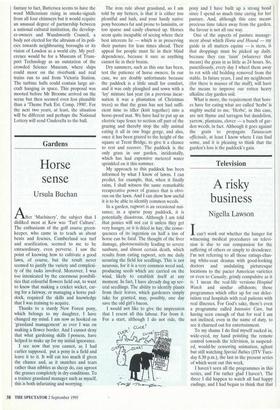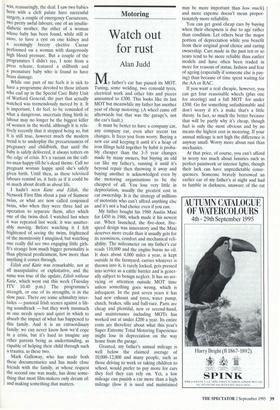Television
A risky business
Nigella Lawson
Ican't work out whether the hunger for witnessing medical procedures on televi- sion is due to our compassion for the suffering of others or simply to decadence. I'm not referring to all those ratings-chas- ing white-coat dramas with good-looking doctors and undulating picturesque locations to the pacier American varieties or even to Casualty, grimly compulsive as it is. I mean the real-life versions: Hospital Watch and similar offshoots; those programmes which offer up for our delec- tation real hospitals with real patients with real illnesses. For God's sake, there's even a programme called Intensive Care, but having seen enough of that for real I am not inclined, even in the name of duty, to see it churned out for entertainment.
To my shame I do find myself sucked in, wide-eyed, my hand pointing the remote control towards the television, in suspend- ed, would-be censoring animation, aghast but still watching Special Babies (ITV Tues- day 8.30 p.m.), the last in the present series of which went out this week.
I haven't seen all the programmes in this series, and I'm rather glad I haven't. The three I did happen to watch all had happy endings, and I had begun to think that that was, reassuringly, the deal. I saw two babies born with a cleft palate have successful surgery, a couple of emergency Caesareans, two pretty awful labours, one of an insulin- diabetic mother, the other of a woman Whose baby has been found, while still in utero, to have a cyst on one kidney and a seemingly breezy elective Caesar performed on a woman with dangerously high blood pressure. But a couple of the programmes I didn't see, I note from a press release, featured a stillbirth and a premature baby who is found to have brain damage.
While one part of me feels it is sick to have a programme devoted to those infants Who end up in the Special Care Baby Unit of Watford General, the part that actually watched was tremendously moved by it. It is important, I do feel, to be reminded of What a dangerous, uncertain thing birth is; labour may no longer be the biggest killer of women in the world, although it is rela- tively recently that it stopped being so, but it is still true, however much the modern trend is to underplay the precariousness of pregnancy and childbirth, that until the baby is safely delivered, it always totters on the edge of crisis. It's a variant on the call- no-man-happy-till-he's-dead theme. Call no pregnant woman happy until she's safely given birth. Until then, as these televised labours remind us, it feels as if it could be as much about death as about life.
I hadn't seen Katie and Eilish, the Network First film about a pair of Siamese twins, or what are now called conjoined twins, who when they were three had an operation to separate them, after which one of the twins died. I watched last when it was repeated last week: it was unutter- ably moving. Before watching it I felt frightened of seeing the twins, frightened of the monstrosity I imagined, but watching one really did see two engaging little girls. It's strange how much bigger personality is than physical predicament, how more than anything it comes through.
EilLsh and Katie was remarkable, not at all manipulative or exploitative, and the same was true of the update, Eilish without Katie, which went out this week (Tuesday ITV 10.40 p.m.) The programme's strength, or one of its strengths, is in the slow pace. There are some schmaltzy inter- ludes — pastoral Irish scenes against a lilt- ing soundtrack — but they work inasmuch as one needs space and quiet in which to absorb the impact of what has happened to this family. And it is an extraordinary family: we can never know how we'd cope in a crisis, but it's hard to imagine any other parents being as understanding, as capable of helping their child through such a trauma, as these two.
Mark Galloway, who has made both these documentaries and has made close friends with the family, at whose request the second one was made, has done some- thing that most film-makers only dream of: and making something that matters.



















































 Previous page
Previous page